- Home
- Richard K. Morgan
Black Man / Thirteen Page 3
Black Man / Thirteen Read online
Page 3
“He’s probably tracking you right now, probably let you go so he could do it. You empty-headed cunt, you’ve—”
Now.
Carl threw the door open and found himself facing the two of them across a tiny living room laid with brightly colored rugs. Gray was half turned away, looming over a flinching Gaby, who had backed up and knocked over a tall potted plant by the front door. The reddened handprint was still visible on her face where he’d slapped her. More plants around the room, cheap painted ceramics and Pachamama icons on shelves, a small statue of some saint or other on a shelf, and a Spanish prayer in a frame on one wall. They were in Gaby’s house.
He pitched his voice hard and calm.
“That’s it, Frank. Game over.”
Gray turned slowly, deliberately and, fuck, yes, he had a weapon, a big black cannon of a handgun that seemed welded in the fist at the end of his right hand. A tiny part of Carl, a subroutine immune to the mesh and the betamyeline flooding the rest of his system, identified it as the murder weapon, the ’61 Smith caseless. Better than forty years old, but they said you could lockvoid that gun in orbit, swing around, pick it back up, and it’d still kill things like it just came out of the factory. For the first time in quite a while, he was grateful for the chilly bulk of the Haag in his own hand.
It didn’t help when Gray smiled at him.
“Hello there, UN man.”
Carl nodded. “Put the gun down, Frank. It’s over.”
Gray frowned as if seriously considering it. “Who sent you? Jesusland?”
“Brussels. Put the gun down, Frank.”
But the other man didn’t move at all. He could have been a holoshot on pause. Even the frown stayed on his face. Maybe deepened a little, as if Gray was trying to work out how the hell it had all come to this. “I know you, don’t I,” he said suddenly. “Marceau, right? The lottery guy?”
Keep him talking.
“Close. It’s Marsalis. I like the new face.”
“Do you?” The Smith still hung loose in his grip, arm at his side. Carl wondered if Gray was meshed yet. It’d make a difference to his speed if he was, but that wasn’t the real problem. The real problem was the difference it’d make to Gray’s attitude. “Try to fit in, you know. Deru kui wa utareru.”
“I don’t think so.”
“No?” And the slow, alarming smile Carl had hoped he wouldn’t see.
“You were never going to get hammered down, Frank. None of us does, that’s our problem. And that’s an appalling Japanese accent. Want my advice, you’d be better off delivering your folk wisdom in English.”
“I don’t.” The smile became a grin. He was going, sliding into the crack. “Want your advice, that is.”
“Why don’t you put the gun down, Frank?”
“You want a fucking list?”
“Frank.” Carl stayed absolutely still. “Look at my hand. That’s a Haag pistol. Even if you get me, I don’t have to do more than scratch you on the way down. It is over. Why don’t you try to salvage something?”
“Like you have, you mean?” Gray shook his head. “I’m nobody’s puppy, UN man.”
“Oh grow up, Frank.” The sudden snap of the anger in his own voice was a surprise. “We’re all somebody’s puppy. You want to get dead, go right fucking ahead and make me do it. They pay me just the same.”
Gray tautened visibly. “Yeah, I’ll bet they fucking do.”
Carl got a grip on his own feelings. He made a slow, damping motion with his free hand. “Look—”
“Look, nothing.” A mirthless grin. “I know my score. Three Euro-cops, couple of Jesusland state troopers. You think I don’t know what that means?”
“It’s Brussels, man. They got jurisdiction. You don’t have to die. They’ll put you away, but—”
“Yeah, they’ll put me away. You ever spend time in the tract?”
“No. But it can’t be a lot worse than Mars, and you were going there anyway.”
Gray shook his head. “Wrong. On Mars, I’ll be free.”
“That’s not what it’s like, Frank.”
Gaby ran at him, screaming.
There wasn’t a lot of space to cross, and she’d come more than halfway, hands up, fingers splayed like talons, when he shot her. The Haag gun made a deep cough, and the slug caught her somewhere high in the right shoulder. It spun her completely around and knocked her into Gray, who was already raising the Smith. He got off a single shot, a sprung-sounding boom in the tiny room, and the wall blew apart at Carl’s left ear. Deafened, stung in the face and side of the head with impact fragments, Carl threw himself clumsily sideways and put four slugs into the other man. Gray staggered backward like a boxer taking heavy blows, hit the far wall, and thumped down into a sitting position on the floor. The Smith was still in his hand. He stared up at Carl for a moment, and Carl, moving cautiously closer, shot him twice again in the chest. Then he watched carefully, gun still leveled, until the life dimmed out of Gray’s eyes.
Biotech account—closed.
On the floor, Gaby tried to prop herself up and slipped on some of her own blood. The wound in her shoulder was leaking copiously down her arm and onto the gaily colored rug under her. Haag shells were designed to stay in the body—the wall behind Gray was pristine—but they made a lot of mess going in. She looked up at him, making a tiny panicked grunting in the back of her throat over and over.
He shook his head.
“I’ll go and get some help,” he said, in Quechua.
He stepped past her to the front door and opened it.
Then, in the flood of light from outside, he swiveled quietly and shot her once more, through the back of the head.
CHAPTER 2
They arrested him, of course.
Drawn by the gunfire, a squad of body-armored camp security came scuttling up the street, clinging to the cover of building edges and stopped vehicles like so many man-size beetles. Sunlight gleamed on their dull blue chest carapaces and the tops of their helmets, glinted off the barrels of the short, blunt assault rifles they carried. They were as silent as beetles, too—in all probability, their gh-stamped riot gear and weaponry came with an induction mike and coms link package. He imagined it from their point of view. Hushed, shocked voices on the wire. Goggle-eyed vision.
They found Carl seated cross-legged on the steps up to the prefab’s front door, hands offered outward, palms up. It was a tanindo meditation stance, one he’d learned from Sutherland, but he was anything but meditative. The effects of the mesh were ebbing now, and the pain from his injured side was beginning to creep back. He breathed through it and kept his body immobile. Watched intently as the security squad crept up the street toward him. He’d set out the Haag pistol and his Agency license in the street a good four or five meters away from where he sat, and as soon as the first armored form nosed up to him, assault rifle slanting down from the shoulder, he lifted his hands slowly into the air above his head. The boy in the riot gear was breathing harshly; under the helmet and goggles his young face was taut with stress.
“I am a genetic licensing agent,” Carl recited loudly in Spanish. “Retained under contract by UNGLA. That’s my authorization, lying there in the street with my gun. I am unarmed.”
The rest of the squad moved up, weapons similarly leveled. They were all in their teens. A slightly older squad leader arrived and took stock, but his sweat-dewed face didn’t look any more confident. Carl sat still and repeated himself. He needed to get through to them before they looked inside the ’fab. He needed to establish some authority, even if it wasn’t his. Inside the high-tech riot gear, these were conscripts just like the ones he’d ridden into town with. Most of them would have left school at fourteen, some even earlier. The European Court might mean next to nothing to them, and their attitude toward the UN was likely to be ambivalent at best, but the Agency license was an impressive-looking piece of plastic and hologear. With luck, it would weigh in the balance when they found the bodies.
&nb
sp; The squad leader lowered his rifle, knelt beside the license, and picked it up. He tipped the holoshot back and forth, comparing it with Carl’s face. He stood up and prodded the Haag gun doubtfully with the toe of his boot.
“We heard shots,” he said.
“Yes, that’s correct. I attempted to arrest two suspects in an UNGLA live case and they attacked me. They’re both dead.”
Looks shuttled back and forth among the young, helmeted faces. The captain nodded at two of his squad, a boy and a girl, and they slid to the sides of the prefab door. The girl called a warning into the house.
“There’s no one alive in there,” Carl told them. “Really.”
The two squad members took the door in approved fashion, swung inside and banged about from room to room, shouting their redundant warnings to surrender. The rest of them waited, weapons still leveled on Carl. Finally, the female member of the entry team came out with her assault rifle slung, crossed to the captain, and muttered in his ear. Carl saw how the squad leader’s face darkened with anger as he listened. When the girl had finished her report, he nodded and took off his sun lenses. Carl sighed and met the customary stare. The same old mix, fear and disgust. And this young man was already unfastening a blue plastic binding loop from his belt. He pointed at Carl like something dirty.
“You, get up,” he said coldly. “Get your fucking hands behind your back.”
By the time they cut him loose again, his fingers were numb and his shoulders ached in their sockets from trying to press his wrists closer together. They’d drawn the loop savagely tight—even clenching his fists as they did it hadn’t won him much slack when he relaxed his hands again, and the tension in his arms tended to force his wrists apart so that however he positioned himself, the loop cut into flesh. On top of the stab wound in his side, it wasn’t what he needed.
They’d found the injury when they searched him, but they were more concerned with emptying his pockets than treating him for damage. They didn’t take off the binding loop. As long as he didn’t die in custody, he guessed they didn’t much care what shape he was in. At the camp security center, they cut back his clothing; a barely interested medic prodded around the wound, declared it superficial, sprayed it with antibac, glued it shut, and taped a dressing to it. No analgesics. Then they left him in a lightly piss-scented plastic holding cell while the GH director pretended for two hours that he had more pressing matters to attend to than a double shooting in his camp.
Carl spent the time going over the confrontation with Gray, looking for a way to play it that didn’t leave Gaby dead. He measured the angles, the words he’d used, the way the conversation had developed. He came to the same conclusion a dozen times. There was only one sure procedure that would have saved Gaby’s life, and that was to shoot Gray dead the moment he stepped out of the bathroom.
Sutherland would have been pissed off, he knew.
No such thing as time travel, he’d rumbled patiently once. Only live with what you’ve done, and try in the future to only do what you’re happy to live with. That’s the whole game, soak, that’s all there is.
Hard on the heels of the memory, Carl’s own thoughts came looking for him.
I don’t want to do this anymore.
Finally, two members of the security squad, male and unarmored, came and marched him out of the cell without removing the loop, then took him to a small office at the other end of the security station. The camp director sat on one corner of a desk swinging his leg and watched as they cut Carl loose without ceremony. The solvent squirt left a couple of drops on his skin that scorched. It didn’t feel accidental.
“I’m very sorry about this,” the director said, in English and without visible remorse. He was pretty much the type, a tall, midforties white guy in designer casuals that approximated light trekking gear. His name, Carl knew from previous research, was Axel Bailey, but he didn’t offer it, or his hand.
“So am I.”
“Yes, clearly you’ve been detained unnecessarily. But if you had identified yourself before running around my camp playing at detective, we might have avoided a lot of unpleasantness.”
Carl said nothing, just rubbed at his hands and waited for the pain as his hands renewed their acquaintance with blood flow.
Bailey cleared his throat.
“Yes, well, we’ve confirmed that Rodriguez was in fact who you claim he was. Some kind of slipup in vetting there, it looks like. Anyway, your office wants you to contact them with a preliminary statement on the shooting, but since we won’t contest the jurisdiction, of course, there’ll be no need for more than that at this stage. However, I would like your assurance that you will file a full report with COLIN as soon as you get back to London, citing our cooperation. If that’s agreed, you’re free to go, and in fact we can assist you with transport out.”
Carl nodded. The first traceries of pain branched spikily out through the flesh of his fingers. “Got it. You want me gone before the press come looking for the story.”
Bailey’s mouth compressed to a thin line.
“I’m having you helicoptered directly to Arequipa,” he said evenly, “so you can get a connecting flight home. Think of it as a gesture of goodwill. Your gun and your license will be returned to you there.”
“No.” Carl shook his head. Under the UNGLA mandate, he could in theory have commandeered the helicopter anyway. In theory. “You’ll give the gun and the license back to me yourself, right now.”
“I beg your—”
“The Haag pistol is UNGLA property. It’s illegal for anyone unauthorized to be in possession of one. Go and get it.”
Bailey’s leg stopped swinging. He met Carl’s gaze for a moment, presumably saw what was there, and cleared his throat. He nodded at one of the security guards, visibly reading his name off the lettering on the breast pocket of his uniform.
“Ah, Sanchez. Go and fetch Mr. Marsalis’s personal effects.”
The security guard turned to leave.
“No.” Carl peeled Sanchez a glance and watched him stop with his hand on the door. He knew he was being childish, but he couldn’t seem to stop himself. He looked back at the director. “I said you go and get it for me.”
Bailey flushed. He came off the edge of the desk. “Listen to me, Marsalis, you don’t—”
Carl closed one painfully fizzing fist up with the other hand. He grimaced. The director’s voice dried up.
“You go and get it for me,” Carl repeated softly.
The moment held, and popped. Still flushing to the roots of his carefully styled hair, Bailey shouldered past and opened the door.
“You watch him,” he snapped at the security guards, and stalked out. Carl saw a grin slip between the two men. He rubbed at his fist some more, shifted to the other hand.
“So which of you two humanitarians spotted me with the cuffmelt?”
The grin vanished into hostile watchfulness and a stiff silence that lasted until Bailey came back with his stuff and the paperwork to match.
“You’ll have to witness for these,” he said sulkily.
Camp security had bagged everything in a forty-centimeter-wide isolation strip, each item gripped tight in the vacuum-sealed plastic. Carl took the strip, unrolled it on the desk to check that everything was there. He pointed at the storage key.
“This is for a locker down by the bus park,” he said. “My pack’s in it.”
“You can collect it on your way to the helicopter,” Bailey said and flicked the release form impatiently at him. “I’ll have my men escort you.”
Carl took the form and laid it on the desk, tore the activation cover off the holorecorder decal in the corner, and leaned over it.
“Carl Marsalis, SIN s810dr576,” he droned, words worn smooth on his tongue with their familiarity “UNGLA authorization code 31 jade. I hereby state that the items on this list are the full complement of property taken from me by GH camp security on June 18, 2107, and now returned to me, date the same.”
&n
bsp; He thumbed the disk to seal it and slid the form away from him across the surface of the desk. A curious suffocating sensation had settled over him as he recited the witness statement, as if it were he and not his personal effects vacuum-sealed in the transparent plastic.
I don’t want to do this anymore.
No, that wasn’t it. He looked up and saw the way Bailey and the two security guards were watching him.
I don’t want to be this anymore.
So.
Choppered out of camp, tilting across the brilliant blue of the lake and then on through bleak, mountainous beauty as they picked their way down from the altiplano to Arequipa. Helicopters like this had smart systems navigation that ran off a real-time satellite model of local terrain and weather, which meant the thing practically flew itself. Still, the pilot stolidly ignored him for the whole flight. He sat alone in the passenger compartment and stared out of the window at the landscape below, idly mapping it onto his memories from Mars. The similarities were obvious—it wasn’t just the thin air COLIN was up here simulating—but in the end, this was still home, with a sky-blue sky up above and the broad sweep of a big-planet horizon out ahead and the slow rolling weight of one full g pulling at your bones.
Accept no substitute. Slogans from the Earth First party political broadcasts blipped through his head. Don’t listen to the corporate hype. Keep your feet on the ground. Fight for a better life here and a better world now.
In the airport at Arequipa, he used his UNGLA credentials to hook a sleeper-class seat aboard the next direct flatline flight to Miami with Delta. He’d have preferred suborbital, but for that you still had to go to Lima, and it probably wasn’t worth the extra time and hassle the detour would take. This way at least he could get some rest. There was about an hour to wait, so he bought over-the-counter codeine, took double the advised dosage, and chased it with something generic from a departure-lounge Buenos Aires Beef Co. outlet. He munched his way through the franchise food on the observation deck, not really tasting it, staring out at the snowcapped volcanic cone of El Misti and wondering if there really, truly wasn’t something else he could do for a living.

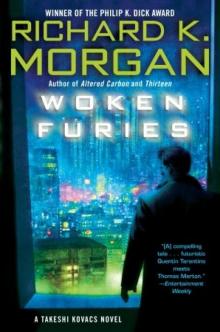 Woken Furies
Woken Furies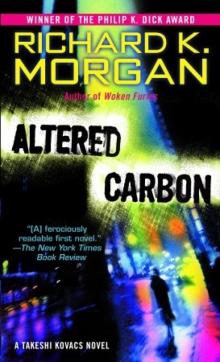 Altered Carbon
Altered Carbon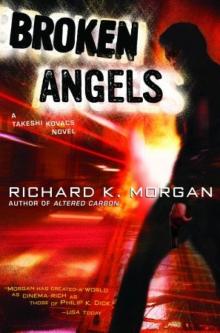 Broken Angels
Broken Angels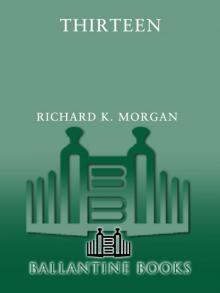 Thirteen
Thirteen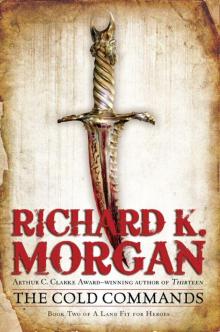 The Cold Commands
The Cold Commands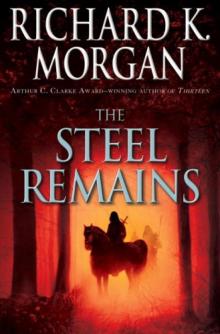 The Steel Remains lffh-1
The Steel Remains lffh-1 Market Forces
Market Forces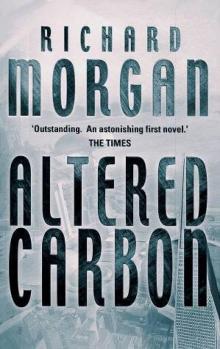 Altered Carbon tk-1
Altered Carbon tk-1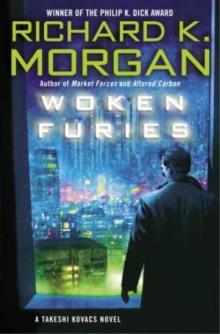 Woken Furies tk-3
Woken Furies tk-3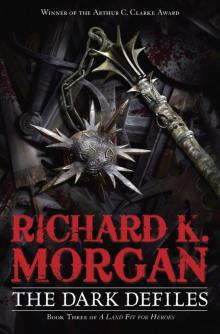 The Dark Defiles
The Dark Defiles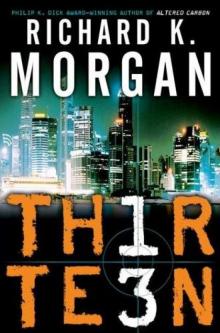 Black Man / Thirteen
Black Man / Thirteen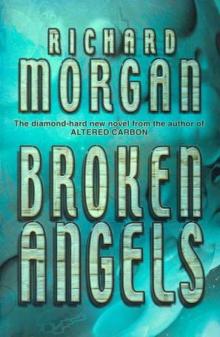 Broken Angels tk-2
Broken Angels tk-2